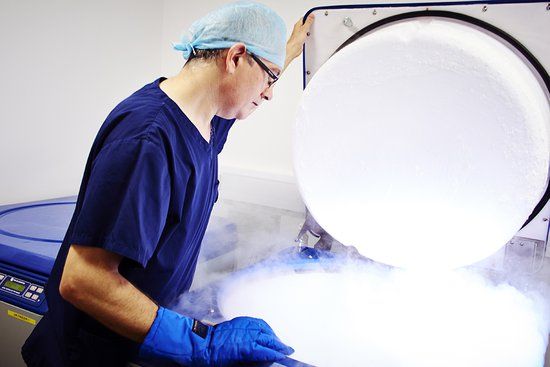We’re now able to offer our patients an egg-freezing service after being granted approval by the HFEA. Here are some common egg-freezing FAQs so you can see what is involved and why some people decide to freeze their eggs:
Why freeze my eggs?
The most common reasons for freezing eggs are:
- Medical treatment: Many women choose to freeze their eggs if they’re about to undergo medical treatment which could affect their fertility, including chemotherapy.
- Choosing when to have children: Some women freeze their eggs so that they can have a family later in life, without worrying that the quality of their eggs has declined due to their age.
We also freeze eggs as an emergency procedure for patients undergoing IVF treatment, if there are any issues obtaining a sperm sample once eggs have been retrieved. This ensures the eggs can still be used when the sperm sample is ready.
What does egg freezing treatment involve?
You are given fertility drugs to produce more eggs than usual, and carefully monitored to make sure your egg development is normal. Once the eggs are ready, an egg collection procedure takes place under sedation.
How does the egg freezing process work?
The eggs are frozen using a new technique called vitrification. Once frozen your eggs would be stored in liquid nitrogen until you wish to try to conceive with them.
How long can I store my frozen eggs?
The standard storage period for storing eggs is 10 years. In certain circumstances this can be extended. You need to discuss this with your consultant.
What happens when I want to use my frozen eggs to get pregnant?
When you decide you wish to use your frozen eggs you will need to monitor your cycle using an ovulation predictor kit. This enables us to determine the right day to thaw your eggs. Your eggs are thawed, analysed and fertilised via intracytoplasmic sperm injection (ICSI), where a single, best quality and healthy sperm is injected directly into the egg. The best quality embryo(s) will be selected for transfer.
What are the success rates from using egg freezing?
The process of freezing and storing eggs is relatively new – the first birth in the UK from a thawed egg was less than 10 years ago. However, the chances of pregnancy are influenced by a number of factors. These include your age, the number of eggs removed, how successfully they survive the freeze-thaw process, how many are fertilised and how many quality embryos are available for transfer.
Are there any risks for egg freezing?
There is a possibility that not all of your eggs will survive the freeze-thaw process, and as fertilisation can only be achieved using ICSI there are also risks associated with this treatment, which your consultant will discuss with you.
For more information on egg freezing, contact us on 0161 300 2737.
Last updated: 20th January 2020



